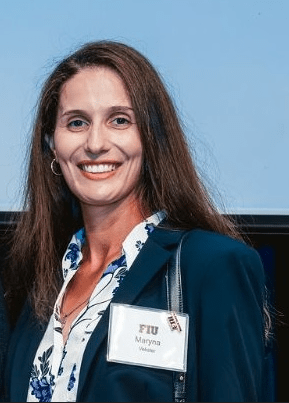
Maryna Veksler
Florida International University
Lecture Information
Engineering Center (EC) 3930 and Zoom
2024-06-14 10:00:00
Abstract
The emergence of digital technologies creates a need for more robust forensic methods. Concurrently, the advancement of artificial intelligence (AI) algorithms provides more robust and accurate methods to conduct forensic examinations. Despite progress, AI-based multimedia forensic need efficiency improvements, while attackers continue to develop techniques to compromise these methods.
Therefore, researchers and investigators require a comprehensive knowledge of anti-forensic to understand the weaknesses of existing methods and implement protective mechanisms.
Additionally, the lack of guidelines for practical integration and use of AI-based digital forensics leads to the hesitation of the investigators to use black-box results.
Establishing the authenticity of the multimedia evidence by validating the source device is crucial in forensics. While progress has been made in identifying image source cameras, video source camera requires more sophisticated AI-based approaches. However, these methods lack consensus on effectively extracting camera-specific patterns, are often unsuitable for the same camera device analysis, and need higher accuracy. Moreover, they are vulnerable to anti-forensic attacks.
This dissertation proposes a high-performance, adversarial-resistant video source camera identification system utilizing convolutional neural networks, generative adversarial networks, and explainable AI approaches. It aims to generalize and standardize the process for developing effective AI-based digital forensic methods, providing comprehensive guidelines for practical applicability. The proposed framework will be informed by a survey conducted among forensic practitioners to identify challenges and opportunities in applying AI to practical forensics.
Biography
Maryna Veksler is a PhD candidate at the Advanced Wireless and Security Lab (ADWISE), Knight Foundation School of Computing and Information Sciences at Florida International University, working under supervision of Dr. Kemal Akkaya. Her research interests include digital forensic, artificial intelligence, drones, and cybersecurity. Her work aims at closing the gap between the development of artificial intelligence-based digital forensic methods and their practical usage. Before pursuing her Ph.D., Maryna worked as a full stack mobile developer at General Motors, where she worked on implementing vehicle remote control commands and enhanced distribution and development pipeline for the mobile apps via automation.
Maryna is the first author of several peer-reviewed publications presented at prestigious venues such as IEEE Conference of Multimedia Information Processing and Retrieval (MIPR), IEEE Military and Communication (MILCOM) Conference, ACM ASIA Conference on Computer and Communication Security (CCS), and IEEE Multimedia journal, and has co-authored papers in International Conference on Digital Forensics and Cyber Crime resulting in the US patent, and ACM/SIGAPP Symposium on Applied Computing.
